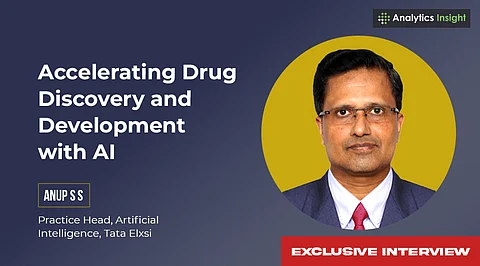Tata Elxsi’s AI Center Transforms Drug Discovery Landscape

The global pharmaceutical industry is undergoing a significant transformation, driven by advancements in artificial intelligence (AI). Tata Elxsi’s AI Center of Excellence (CoE) is at the forefront of this change, harnessing innovative technology to redefine drug discovery and development. With the AI in healthcare market projected to reach USD 67.72 billion by 2025, and the Asia-Pacific region anticipating USD 2.5 trillion in growth, the integration of AI into pharmaceutical research and development has become essential.
At the helm of this initiative is Anup S. S., Practice Head of AI and Machine Learning. His team is leveraging predictive analytics, digital twins, and AI-enabled diagnostics to enhance the efficiency of drug discovery processes. In an exclusive discussion, S. S. elaborated on how the AI CoE accelerates R&D, improves clinical trial outcomes, and shapes the future of the pharmaceutical industry.
Redefining Drug Discovery with AI
Tata Elxsi’s AI Center of Excellence is transforming the landscape of drug discovery. By employing advanced AI and machine learning techniques, the CoE integrates diverse datasets, including molecular structures, genomic data, and clinical insights. This integration allows scientists to pinpoint promising drug targets with greater accuracy and speed compared to traditional methods.
AI-driven analytics enable the simulation of molecular interactions and the prediction of biological responses. This capability significantly reduces the time required for experimental validation. Furthermore, AI plays a crucial role in drug design and optimization, facilitating the creation of molecules with desired properties and even repurposing existing drugs for new therapeutic indications. This comprehensive strategy accelerates the entire R&D process, from target identification to clinical trials, ultimately resulting in the faster development of effective therapies.
The use of digital twins and simulation models further shortens development cycles, making drug discovery more efficient and responsive to urgent healthcare needs.
Enhancing Clinical Trials Through AI
The integration of AI is revolutionizing clinical trials by improving patient selection, monitoring, and retention. By analyzing extensive datasets, such as genetic profiles, medical histories, and demographic information, AI models identify the most suitable candidates for trials. This precision enhances the likelihood of trial success and reduces recruitment time.
During trials, AI-powered tools monitor patient adherence and detect adverse effects early, utilizing real-time health metrics from wearable devices and digital health platforms. This continuous monitoring ensures higher data quality and allows for timely adjustments, leading to results that are more focused on outcomes. AI can also predict the risk of patient dropout by analyzing engagement patterns, enabling trial teams to proactively address issues and improve retention.
These innovations streamline the clinical trial process, reduce costs, and enhance the reliability of outcomes, addressing one of the industry’s most pressing challenges.
Bias in clinical trial data can significantly affect treatment outcomes. Tata Elxsi is leveraging AI to identify and mitigate such biases. By employing algorithms to scrutinize datasets for demographic or geographic biases, the company can design more inclusive studies. During the analysis phase, AI techniques adjust for confounding variables, providing a clearer picture of treatment efficacy across diverse populations. While there is potential for AI to inadvertently amplify biases if trained on non-representative data, Tata Elxsi emphasizes transparency and diverse training datasets, which enhances the ability to create equitable trials.
Balancing Innovation and Compliance
Regulatory alignment is crucial when deploying AI in pharmaceuticals to ensure safety and efficacy. Tata Elxsi prioritizes collaboration with regulatory bodies, adopting a transparent approach to AI development. The company focuses on rigorous documentation, validation, and explainability of AI models. This commitment builds trust and meets compliance standards.
Maintaining a balance between innovation and regulatory requirements involves continuous dialogue with regulators and adherence to evolving guidelines. Tata Elxsi integrates compliance checks throughout the AI development lifecycle, ensuring that innovative solutions can be seamlessly incorporated into the drug development pipeline without sacrificing regulatory standards.
Overcoming Challenges in AI Integration
Pharmaceutical companies face numerous challenges when integrating AI into existing discovery and development pipelines. These include data silos, a lack of internal expertise, and resistance to change. Tata Elxsi addresses these challenges by offering tailored solutions that facilitate smooth data integration across systems.
The company also provides training and change management support to empower teams, fostering confidence in AI tools. By customizing AI models to align with specific organizational workflows, Tata Elxsi minimizes disruption. Demonstrating tangible benefits early on and ensuring regulatory compliance builds trust and encourages adoption.
Looking to the future, AI is expected to profoundly impact the entire pharmaceutical value chain, extending beyond discovery to areas like post-market surveillance and real-world evidence generation. AI will continuously analyze real-world data, including electronic health records and patient-reported outcomes, to monitor drug safety and effectiveness in real time. This ongoing surveillance can identify rare adverse events and long-term effects not captured during clinical trials.
By combining AI insights with advanced analytics, pharmaceutical companies can adapt strategies based on real-world performance, optimize treatment protocols, and develop next-generation therapies. This dynamic, data-driven approach is set to make healthcare more responsive and personalized, ultimately improving patient outcomes and driving innovation across the life sciences sector.





